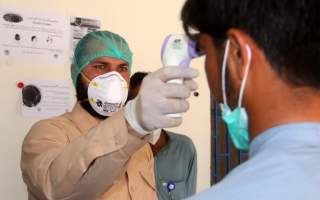
The U.S. Treasury is now allowing some humanitarian trade but it may not be enough—and the damage is already done.
The Trump administration is partially reversing course on economic sanctions that have slowed down Iran from importing coronavirus test kits as the country faces down the most deadly COVID-19 outbreak outside of East Asia.
Iranian authorities have confirmed 388 cases of the new coronavirus disease as of Friday afternoon. U.S. sanctions, the Iranian government’s record of dishonesty, and the elusive nature of the virus itself have made it difficult to understand the true extent of the epidemic.
The U.S. Treasury announced on Thursday morning that it was lifting some terrorism-related sanctions on the Central Bank of Iran, which re-opens a channel for humanitarian trade that had been closed since September 2019. The announcement does not lift the restrictions on humanitarian trade with other Iranian banks under terrorism-related sanctions.
Iran’s healthcare sector has blamed the banking sanctions for a lack of testing equipment to diagnose COVID-19. Thirty-four people have reportedly died from the virus in Iran, suggesting a large number of undiagnosed cases of COVID-19, which scientists believe has a two percent mortality rate. In fact, independent researchers estimate that eighteen thousand Iranians may have been infected already.
“Several international companies are ready to ship the coronavirus diagnosis kit to Iran, but we cannot pay them,” said Ramin Fallah, vice president of the Iranian Union of Importers of Medical Equipment, in a Monday interview with Iranian media. “They also insist that the money should only be sent through banks. Although there are ways to get around [sanctions], it is time-consuming.”SPONSORED CONTENT



